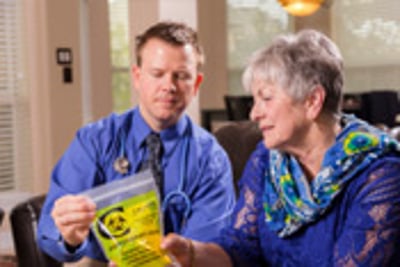Keyword: brca



Relevance: Medium
Most relevant for: Women from a family with a known BRCA mutation who tested negative for the mutation in the family
Study: Is breast cancer risk increased in women who test negative for the BRCA mutation in their family?
Some women who do not carry a BRCA mutation, but come from a BRCA-positive family, still develop breast cancer. This research examines whether these women are at higher risk for breast cancer, or whether their risk is similar to women in the general population. (4/19/16)
READ MORE ›


Relevance: Medium-High
Most relevant for: Young women diagnosed with breast cancer who have not yet had genetic testing
Study: BRCA testing in young women with breast cancer
National guidelines recommend genetic testing for BRCA mutations in young women who are diagnosed with breast cancer. However, little is known about how women decide to get testing, or how they use genetic information to decide on treatment options. This study found that genetic testing is increasing among young breast cancer survivors, and it explores some of the factors that play into patients’ decision making about genetic testing. (3/22/16)
READ MORE ›


Relevance: Medium
Most relevant for: People diagnosed with cancer
Study: What are the genetics underlying 12 different cancer types?
As gene sequencing has become more affordable, researchers and health care providers are now looking for mutations in many genes beyond BRCA1, BRCA2 and others that are associated with known hereditary cancer syndromes. By sequencing thousands of genes rather than just one or two, researchers can better understand which inherited mutations affect cancer risk. In this study, researchers sequenced thousands of genes in patients with one of 12 cancers, including breast, and catalogued which gene mutations are most commonly found in each cancer. (03/01/16)
READ MORE ›


Relevance: Medium-High
Most relevant for: People who smoke cigarettes
Study: Smoking before or after a breast cancer diagnosis associated with poorer breast cancer survival
Cigarette smoking is an important public health issue that causes more than 480,000 deaths annually. Smoking increases the risk of many diseases, from heart disease to stroke. This research indicates that smoking before and or after a diagnosis of breast cancer affects survival, and also shows that it is never too late to quit smoking. (02/23/16)
READ MORE ›


Relevance: Medium-High
Most relevant for: Young women at high risk for breast cancer with limited access to mammography and MRI is not easily accessible
Study: How do ultrasound and mammography compare in breast cancer screening?
Mammography has been shown to reduce breast cancer deaths; however, women in developing countries don’t have easy access to mammography. Ultrasound screening, on the other hand, is portable and less expensive, and could be an alternative to mammography. This study compared mammography to ultrasound in women with dense breasts and found the two techniques have similar cancer detection rates, although the false positive rate is higher with ultrasound. (02/16/16)
READ MORE ›



Relevance: Medium
Most relevant for: Breast cancer patients who have an inherited mutation and breast cancer patients who developed leukemia after treatment for breast cancer.
Study: Potential genetic basis for breast cancer survivors who develop therapy-related leukemia
The population of breast cancer survivors in the United States is increasing. One rare but dangerous long-term effect of breast cancer treatment is an increased risk of leukemia, a type of bone marrow cancer. A recent study uncovered a potential genetic basis for this condition. (01/26/2015)
READ MORE ›


Relevance: Medium-High
Most relevant for: Women with early stage breast cancer
Study: Does lumpectomy or mastectomy provide better survival for women with early stage breast cancer?
Previous research has hinted that women who have breast-conserving surgeries have the same, if not better, overall survival as women who have mastectomies. Researchers in this study wanted to see if that was true; they found that women who chose breast-conserving surgeries did have a higher overall survival. However, this study, presented at the 2015 San Antonio Breast Cancer Symposium, had limitations that make it difficult to interpret the results or to extend them to all women with breast cancer. (01/19/2016)
READ MORE ›


Relevance: Medium
Most relevant for: Women who use personal care products that contain parabens.
Study: Do parabens in personal care products increase breast cancer risk?
Parabens are chemicals that can mimic the hormone estrogen in the body. As estrogen has been shown to increase breast cancer risk, some people have asked if parabens found in some cosmetics and shampoos will also increase breast cancer risk. Many studies have shown that parabens in the quantities found in personal care products are safe. A recent study of human breast cancer cells suggests that in certain conditions, parabens could help some breast cancer cells grow. It is important to remember that this is early research; this single laboratory-based study does not conclusively prove that parabens are dangerous. More work, including human studies, needs to be done to understand if parabens increase cancer risk. (01/16/2016)
READ MORE ›


Relevance: Low
Most relevant for: This research is not relevant to people
Study: Study uses mice and brains from deceased Alzheimer’s patients to assess BRCA1 involvement
Researchers noted reduced levels of BRCA1 protein in the brains of mice and deceased Alzheimer's patients. While this study is interesting early work on the biology of Alzheimer's disease, the focus was primarily Alzheimer's disease, rather than the effect of BRCA1 mutations on Alzheimer's. Therefore, this study's observation may be something that is seen in Alzheimer's patients, but does not necessarily cause the disease. No studies suggest that BRCA1 mutation carriers are at increased risk for Alzheimer's disease. (12/22/2015)
READ MORE ›


Relevance: Medium
Most relevant for: Survivors of childhood cancer and people with a family history of relatives diagnosed with childhood cancers
Study: How many children with cancer have mutations in genes that increase cancer risk?
Many genes are associated with increased cancer risk in adults, but it is unclear how common these mutations are in children with cancer. This study found that about 9% of children with cancer carry mutations in a gene that is known to increase cancer risk. Over half of the mutations were in the TP53 gene, which is associated with increased cancer risk at a young age and increased risk of breast cancer in adults. (12/15/2015)
READ MORE ›